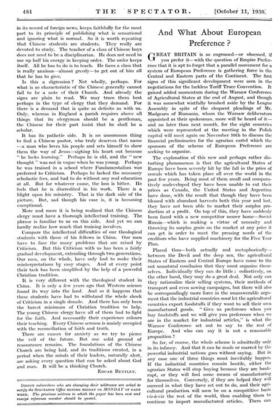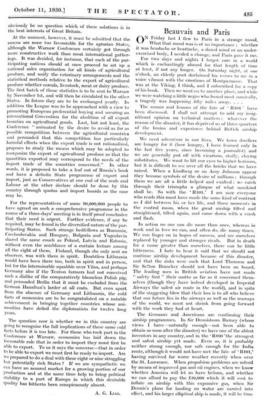And What About European Preference ?
CIREAT BRITAIN is so engrossed—or obsessed, if you prefer it—with the question of Empire Prefer- ence that it is apt to forget that a parallel movement for a system of European Preference is gathering force in the Central and Eastern parts of the Continent. The first signs of this significant development were seen in the negotiations for the luckless Tariff Truce Convention. It gained added momentum during the Warsaw Conference of Agricultural States at the end of August, and though it was somewhat wistfully brushed aside by the League Assembly in spite of the eloquent pleadings of Mr. Madgearu of Rumania, whom the Warsaw deliberators appointed as their spokesman, more will be heard of it— and no later than next month, for the eight countries which were represented at the meeting in the Polish capital will meet again on November 10th to discuss the financial preliminaries for the agrarian cartel which the sponsors of the scheme of European Preference are seeking to organize.
The explanation of this new and perhaps rather dis- turbing phenomenon is that the agricultural States of Europe have been severely hit by the fall in the price of cereals which has taken place all over the world in the past few years. Being most of them small and compara- tively undeveloped they have been unable to cut their prices as Canada, the United States and Argentina have done, with the result that though they have been blessed with abundant harvests both this year and last, they have not been able to market their surplus pro- duction at a profit. On top of this, they have suddenly been faced with a new competitor nearer home—Soviet Russia—which is making a virtue of necessity and throwing its surplus grain on the market at any price it can get in order to meet the pressing needs of the creditors who have supplied machinery for the Five Year Plan.
Placed thus—both actually and metaphorically—. between the Devil and the deep sea, the agricultural States of Eastern and Central Europe have come to the not unnatural conelusion that they must organize them- selves. Individually they can do little ; collectively, on the other hand, they may do a great deal. Not only can they rationalize their selling systems, their methods of transport and even sowing campaigns, but there will also be correspondingly more force in the unanswerable argu- ment that the industrial countries inue let the agricultural countries export foodstuffs if they want to sell their own manufactured goods. "Give us preference when you buy foodstuffs and we will give you preference when we are in the market for industrial articles," is what the Warsaw Conference set out to say to the rest of Europe. And who can say it is not a reasonable proposition ?
So far, of course, the whole scheme is admittedly only in its infancy. And that it can be made or marred by the powerful industrial nations goes without saying. But in any case one of three things must inevitably happen. If the industrial countries remain hostile, either the agrarian States will stop buying because they are bank- rupt, or they will find some means of manufacturing for themselves. Conversely, if they are helped they will succeed in what they have set out to do, and their agri- obviously be no question which of these solutions is in the best interests of Great Britain.
At the moment, however, it must be admitted that the -omens are none too favourable for the agrarian States, although the Warsaw Conference certainly got through snore constructive work than most international gather- ings. It was decided, for instance, that each of the par- ticipating nations should at once proceed to set up a national sales organization for all kinds of agricultural produce, and unify the veterinary arrangements and the statistical methods relative to the export of agricultural produce whether cereals, livestock, meat or dairy produce. The first batch of those statistics is to be sent to Warsaw by November 1st, and will then be circulated to the other States. In future they arc to be exchanged yearly. In addition the League was to be approached with a view to promoting European preferential buying and securing an international Convention for the abolition of all export bounties on agricultural goods. Last, but not least, the Conference "animated by the desire to avoid as far as possible competition between the agricultural countries and persuaded that this competition has particularly harmful effects when the export trade is not rationalized, proposes to study the means which may be adopted to reorganize the export of agricultural produce so that the quantities exported may correspond to the needs of the import trade of the countries concerned." In other words, it is proposed to take a leaf out of Russia's book and have a definite State programme of export and import, just as Conservatives at one end of the scale and Labour at the other declare should be done by this country through quotas and import boards as the case may be.
For the representatives of some 90,000,000 people to have agreed on such a comprehensive programme in the course of a three-days' meeting is in itself proof conclusive that their need is urgent. Further evidence, if any be required, may be found in the diversified nature of the par- ticipating States. Such strange bedfellows as Rumania, Czechoslovakia and Hungary, Bulgaria and Yugoslavia shared the same couch as Poland, Latvia and Estonia, without even the semblance of a curtain lecture among all the eight of them. Finland, though she only sent an observer, was with them in spirit. Doubtless Lithuania would have been there too, both in spirit and in person, but for the interminable squabble over Vilna, and perhaps Germany also if the Teuton farmers had not conceived such a dislike of the comparatively blameless Polish pig; and persuaded Berlin that it must be excluded from the German Hausfrau's larder at all costs. But even apart from the absence of Germany and Lithuania, the cold facts of economics are to be congratulated on a notable achievement in bringing together countries whose ani- mosities have defied the diplomatists for twelve long years.
The question now is whether we in this country are going to recognize the full implications of these same cold facts before it is too late. For those, who took part in the Conference at Warsaw, economics has laid down the inexorable rule that in order to import they must first be able to export. To us it says the converse—that in order to be able to export we must first be ready to import. Are we prepared to do a deal with these eight or nine struggling but potentially rich States ? If we are sympathetic we can have an assured market for a growing portion of our Production and at the same time help to bring political stability to a part of Europe in which this desirable quality has hitherto been conspicuously absent.
A. G. Lias.









































 Previous page
Previous page